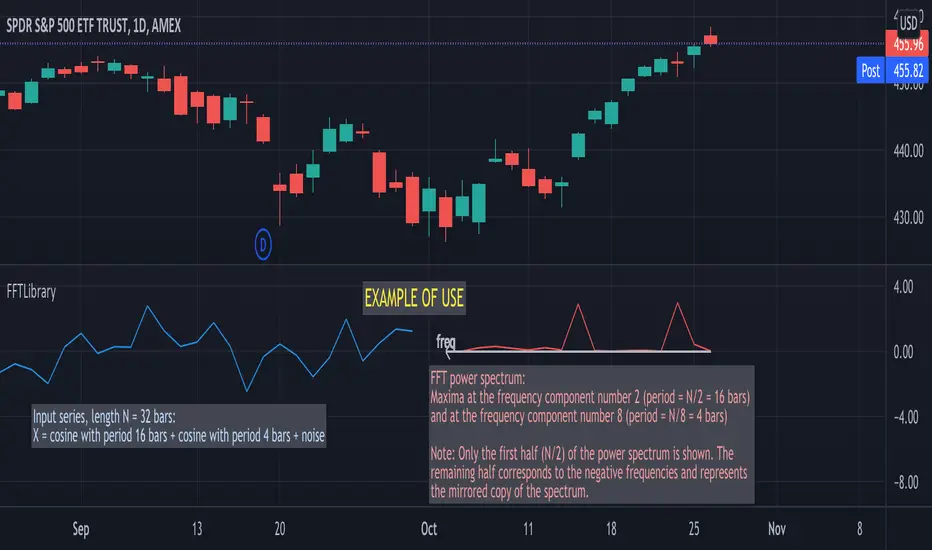FFTLibrary

FFT function
fft(x, y, dir) : Computes the one-dimensional discrete Fourier transform using an [url=paulbourke.net/miscellaneous/dft/ ]in-place complex-to-complex FFT algorithm. Note: The transform also produces a mirror copy of the frequency components, which correspond to the signal's negative frequencies.
Parameters:
x: float array, real part of the data, array size must be a power of 2
y: float array, imaginary part of the data, array size must be the same as x; for real-valued input, y must be an array of zeros
dir: string, options = ["Forward", "Inverse"], defines the direction of the transform: forward" (time-to-frequency) or inverse (frequency-to-time)
Returns: x, y: tuple (float array, float array), real and imaginary parts of the transformed data (original x and y are changed on output)
Helper functions
fftPower(x, y) : Helper function that computes the power of each frequency component (in other words, Fourier amplitudes squared).
Parameters:
x: float array, real part of the Fourier amplitudes
y: float array, imaginary part of the Fourier amplitudes
Returns: power: float array of the same length as x and y, Fourier amplitudes squared
fftFreq(N) : Helper function that returns the FFT sample frequencies defined in cycles per timeframe unit. For example, if the timeframe is 5m, the frequencies are in cycles/(5 minutes).
Parameters:
N: int, window length (number of points in the transformed dataset)
Returns: freq : float array of N, contains the sample frequencies (with zero at the start).
Pine Bibliothek
Ganz im Sinne von TradingView hat dieser Autor seinen/ihren Pine Code als Open-Source-Bibliothek veröffentlicht. Auf diese Weise können nun auch andere Pine-Programmierer aus unserer Community den Code verwenden. Vielen Dank an den Autor! Sie können diese Bibliothek privat oder in anderen Open-Source-Veröffentlichungen verwenden. Die Nutzung dieses Codes in einer Veröffentlichung wird in unseren Hausregeln reguliert.
Haftungsausschluss
Pine Bibliothek
Ganz im Sinne von TradingView hat dieser Autor seinen/ihren Pine Code als Open-Source-Bibliothek veröffentlicht. Auf diese Weise können nun auch andere Pine-Programmierer aus unserer Community den Code verwenden. Vielen Dank an den Autor! Sie können diese Bibliothek privat oder in anderen Open-Source-Veröffentlichungen verwenden. Die Nutzung dieses Codes in einer Veröffentlichung wird in unseren Hausregeln reguliert.